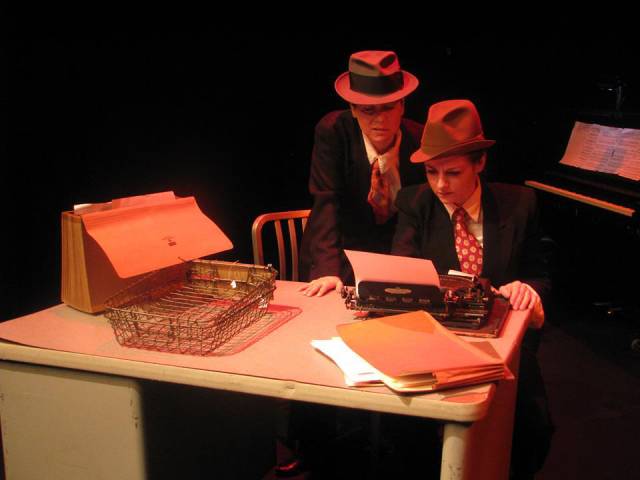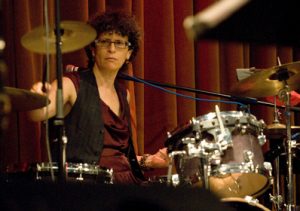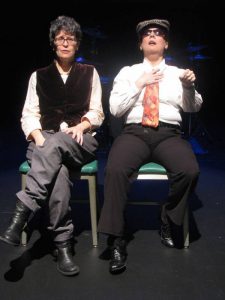

June 4th through June 7th, Isle of Klezbos and Eve Sicular are restaging J Edgar Klezmer: Songs from my Grandmother's FBI Files, a musical documentary about government surveillance, activism in during the Cold War, and hidden family secrets with a soundtrack that boasts several musical genres from baroque to jazz to Klezmer. I sat down with Eve Sicular, the skin-beater and creative director, to discuss how the work has evolved since its last run in 2009 and just what is the modern FBI interested in these days.
Can you tell us about the inception of this project?
Well, this has been a project that began in terms of actually creating and performing seven years ago, so I guess I've just been blessed that I had such a wonderfully versatile set of people to work with and ideas from different archival experiences in the past, both in terms of researching song repertoire [and] looking into things like the subtext of different kinds of Yiddish cinematic work. So I had all these things that inspired me to think, "Well, if it seems like the FBI had information on my grandmother [Dr. Adele Sicular], I'd like to pursue it." That was like in 2002 to 2003, and then [I spent] a few years of mulling it over and deciding, as a musician, what's one of the best ways that I can really turn this information about my grandmother and what she went through into something that really reaches all kinds of people to consider this story and the kind of work that she and her activist comrades were up to? And what does surveillance by the government mean? And then all kinds of other things that are much more personal. A million stories came up while pursuing the material in this little government subsidized time capsule courtesy of the FBI.

You mentioned the amazing group of people that you work with and this latest version of the play is really kind of a blending of all your different projects together.
Yeah, and even beyond, because I really liked the work of Yelena Shmulenson and I knew that I was looking for an actor to go into a few of the roles. Yelena was somebody who I had just seen performed in a couple of Yiddish theater projects and I thought “Ya know, I'm just going to approach her in case she's interested” because I think she's got this amazing range of cultural affect that she can draw on, and little did I know that she had at that time already just filmed for the Coen brothers for A Serious Man. So it was in the can at that point but not out in public so we kinda scored because she's just so great to work with. Her star was rising and now she's just in the same position with Orange is the New Black where they've done their filming for her episodes in Season 3, but people haven't yet seen her in that. She was also just in some amazing reading with the show called Making Stalin Laugh. She's basically working characters and scenarios that are both sides of the Iron Curtain, like the same 1940s era.
I think you probably just answered my question, what is the most exciting new collaboration? I guess Yelena was on your wish list.
Yeah, I would say that's true. But on the other hand what's really cool is in the past I've written music and I've been fascinated with musicals and obviously I have a whole part of me that is really captivated by different types of vintage or alternative readings of history -- not necessarily looking to be subversive but examining things that maybe haven't been looked at as closely. It’s been exciting for me to create lyrics and I'm really having fun with it. I've been a huge fan since I was basically a toddler and my parents would bring home LPs and start taking us out to some really great classic Broadway revivals and stuff like that, so I was pleasantly surprised that I could make catchy songs outside of anything that was only Klezmer. I mean there's some stuff in here that's R&B. There's some that's more Klezmer-esque. There's a whole baroque portion that I must credit to our vocalist, Melissa Fogarty, who's a real baroque early music specialist.
There's a lot of topics that are covered in this musical/documentary. Socialized healthcare...
Oh yeah, and we haven't gotten to all of it either.
Yeah of course. Well, socialized healthcare is a topic which is a given because your grandmother, on top of being chairman of the citizen's committee, was also a doctor. But in addition to that there's issues like integration and gender equality, which are still very relevant today; did the work have to adapt because things have happened in our culture between 2009 (when it premiered) and 2015?
Absolutely. Obviously we started doing this before anyone heard Edward Snowden. And in fact when I was doing the last round of research back in 2008/2009, another thing that came out more was the extent of the plans that J. Edgar Hoover had and was trying to get approval for from the federal government, [which] included establishing detainment camps and would have suspended habeas corpus for 12,000 people, which is now completely documented through the Freedom of Information Act. They're not front page news for whatever reason, but they get released, very clear, extremely chillingly detailed plans of where people would be deposed and the prisons would be too full so they would take them basically to the camps that they'd been using for the Japanese Americans during WWII. They had it all figured out.
Well, those camps are just sitting there, might as well use them.
Right? "We better find some kind of dangerous people to populate those and get rid of them." I mean the whole idea was it wasn't bad enough about detention centers but to have suspended any rights of these citizens just because they have the potential as defined by Hoover's FBI...

To be some kind of threat.
...to be a kind of threat. But I mean it really was a focus, a huge focus on people who were working for racial integration as well as people who had been on the left, but I mean this was the year they started my grandmother's file. Way less than five years we'd been allies with the Soviet Union and a lot of these things that were documented were things that a mole had provided from work during the war. A few people going to the same hotel ballroom for a gala benefit, that was considered evidence of being too far to the left.
I think you used the word "unsettling" to describe the lengths the FBI were willing to go to stop progress and even today we can see its still a struggle. You mentioned Edward Snowden but then also the recent issues with police brutality and corruption. But there are signs of social progress: Laverne Cox on Time, marriage equality creeping towards the Supreme Court and just an awareness about "queer" culture that is encouraging.
Absolutely, but some of the things that come up in the show -- and really, we do have fun with a lot of this -- are some things that are maybe not entirely saying, "Oh, my grandmother was just such a hero for her activism" because we're looking at a complex human being. My father just really didn't talk that much about his family. There were aspects of this that were very difficult for him, her being so badly ostracized and other things I just can't even be sure what happened. But I also, just by looking this closely, found some things that were also unsettling about her because she went from being a physician working especially with underprivileged people as did her husband in Harlem and she really had to support her family; first as a woman doctor, being an allergist was a specialist that helped her support her two kids and her husband, because he was having a lot of problems. But then she became a psychologist and as it turned out -- I didn't know this, but somehow I knew this -- she had focused on homosexuality in the '40s and '50s, and as somebody who was coming out myself, I was very, very curious and a little bit frightened about what I might find out.
It turned out she had this one mentor who was really, really influential at the time. Then all these different things happened on social media where people saw I was working on this project got in touch. Montgomery Clift's nephew and niece were working on a documentary about their uncle and it turns out that his psychologist, the same doctor, was my grandmother's mentor and had written an introduction to a book called Voyage from Lesbos, which was like the psychoanalysis of a lesbian in the '50s. Another person influenced by Dr. William Silverberg. And that book, decades later, was the reason The Five Lesbian Brothers even got together; their first play together was a parody of that book. And I'm a huge fan of theirs so I was like “I can't believe it!” It's like this missing link. The guy who wrote that book later renounced it: "I was misguided" and "I shouldn't have been trying to cure her." I mean it's very likely that this guy Silverberg was himself a closet case. I mean it's so classic. But he was here in NY. He was on the Upper West Side. My mother remembers him.
There's all these different stories and then finally I found out about a really, really interesting family who remembered my grandmother and probably she, after my grandfather died, she probably had an affair with their dad and so finding out about that was like this whole other side of her that I would have never heard of if I weren't off doing research but also having an unusual name. That's how I found a lot of connections because my name is Sicular, her name was Sicular. My cousin even met a journalist in Beijing in the '80s who recognized the name from someone he met in the Upper West Side during the '40s and '50s and that same journalist wrote a book that among other things covered what it was like to be tailed by the FBI. From there I was able to extrapolate elements to write a song in the show about that. You know, what it was like to have people come and monitor your activities and your apartment. My grandmother's files show all these transcripts where they went in and knocked on everybody's door in her apartment building, everybody's door in her former apartment building, every person in her office at Bellevue. And by the way, the people at Bellevue all stuck up for her and attested to her loyalty because at the time they had an executive order called the Loyalty Order so there were Loyalty Board Reviews, and even though there were no charges brought in the end against my grandmother she still had to resign because otherwise she would have had to be fired and formally granted disloyal or fight this uphill legal battle or take the 5th and implicate people or face perjury just because that Citizen's Committee of the Upper West Side was already considered something that was on the Un-American List. So they kind of had her either way. And they definitely dissolved the Citizen's Committee.
Wow. Well, that leads nicely into our final question, do you think you have an FBI file and what would be in it?
You know, so many people at this point probably have had things collected. I don't really know what today's FBI is looking for, but probably it would be around fracking because I'm very actively opposed to that and it turns out that the FBI did a lot of surveillance against the Occupy movement, specifically. Although this anti-fracking and anti-tar sand movement was in Texas, it does seem as though what we have today is an FBI that very much identifies with corporate interests as being part of what they consider to be state interest. So that any citizen activity, like protesting certain kinds of corporate interests, maybe actively monitored by the FBI. That's what's the most troubling to me. In my grandmother's time I think that anything that was considered a certain kind of "leftist" "socialist" identification and especially activism because frankly my grandfather, he was definitely a member of the Communist party for years and years but they say they have no files on him. So I wonder what that's about but I do know that my grandmother was a public activist. He was much more involved with things that were organizing behind the scenes but she was really a public face.
J Edgar Klezmer: Songs from my Grandmother's FBI Files is performed June 4th through the 7th at the HERE Theater